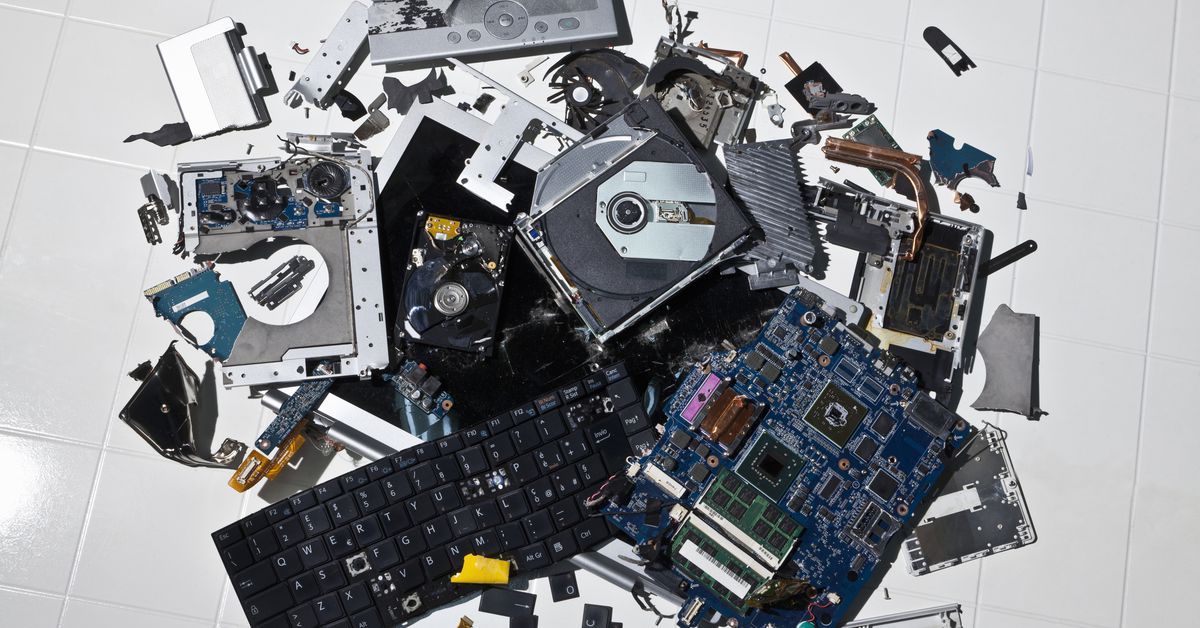Commodities suck because innovation under capitalism works in a plateauing concept. In the early stages when competition is stark, production and innovation rises, until there is an inevitable winner and competition falls and with it the rate of profit as monopolization sets in and the division of labor exasperates.
So they use cheaper and cheaper (crappier and crappier) materials which can extend the rate of profitability, and cut wages further and further including exporting entire industries to where the rate of profitability is higher due to economic immaturity (due to imperial strangulation of that nation), absorb more and more capital to extend the life of capitalism.
It’s capitalism, it isn’t consumerism, the lack of automation, a lack of AI in the production process, or any other capitalist wet dream. The existence of the leeches in our economic system and the organization of capital around such is the problem.
Their method of explaining reality is to take the real reason, then remove any big picture so it’s entirely impotent, and fill in the gaps with stories, feels, and editing tricks to extend the size of the text without adding any content to it. This is their answer to the questions our class asks - long winded tirades of tall tales and half truths.

Well, fucking, said.
To add to this, is the problem of the ideals that capitalistic companies brainwash us into liking. Replaceable batteries on phones is a huge example: If you go back to the year 2002 and try to release a feature phone (pre-smart phone) that has a fucking case sealed with glue and no replaceable battery, you’d get raked over the coals for it and will absolutely get called out for your shameless cash grab of a phone. Even in 2007-2010, tons of critics of the iPhone was still, rightfully, calling out the fact that you can’t replace the battery. Samsung and plenty of other Android manufacturers famously called them out over it and boasted that their phones have replaceable batteries and therefore will last longer (which is true at least on the hardware level, the battery fails in most phones long before the other components do). Annnnnnd jump to the 2020s where every single phone has sealed in batteries, and somehow the mainstream now thinks that having a replaceable battery (as in, a back case that opens easier than Fort Knox) is somehow a sign of a low quality phone. The excuse is made that more “premium” case materials like metal and glass can’t easily be made into a form factor that can open easily (which is total BS by the way, you’re just too lazy and/or greedy to design it), or that a non-sealed case can’t be made to to be IP69 or whatever rating of waterproofness (why do you need a regular phone to withstand anything more than rain or water spills, or at the very worst accidentally dropping into a sink or bathtub and being fished right back out? Which a gasket around the removable case can absolutely do, see: cheap sport watches with replaceable batteries. If I needed to capture images of a blobfish at the bottom of the Marinara’s Trench, sure, I’ll consider a sealed device for waterproofing, otherwise fuck off.) I’d take a thicker phone made of cheap plastic that comes off more easily to reveal a battery and SD card slot over a “premium” feeling phone any day (for that I have a Fairphone, which is great), but apparently I’m in the minority now. And it’s not like 90% of people don’t put a case on their phone and cover up whatever it’s made of anyway. Yeah, you can really feel that chamfered unobtanium edge and mythril back plate through that plastic and rubber OtterBox!
Same with soldered CPUs in computers. There was a time where even laptop CPUs were socketed. This made the laptops a little thicker but WAY more upgradable. Now, neither Intel nor AMD even make non-BGA (that’s the style of soldering for large chips) mobile CPUs anymore, and there is increasing push to solder even desktop CPUs to the motherboard, starting with small form factor, embedded, and special purpose motherboards but absolutely inevitably spreading to that minifridge sized gaming PC of yours that literally has no excuse to not have a socket, and yet, I guarantee you they’ll think of some excuse to do it and the techbro influencers will convince everyone that this is the best way.
We could literally take the 1980s style of home computers where all the RAM chips are socketed (literally individual chips, not on a stick) and it would still work just as well and everything would still be just as fast. Except now you would have way more flexibility in upgrading your machine and could easily replace individual dead chips.
Or especially Graphics Cards manufacturers could totally just let you upgrade your card’s VRAM and Processor(s). They just choose not to.
On the topic of graphics cards, on NVidia’s Kepler cards, specifically the consumer versions, if you de-soldered a single resistor and replaced it with another that has a different value it would suddenly identify itself as its professional counterpart..
I guess the only devil’s advocate there is that to achieve higher memory bandwidths, you do actually need the RAM to be as close to the processor as possible. It’s why Apple’s M1 and M2 processors have higher real-world memory speeds than Intel processors because they moved the RAM to literally on the CPU package itself, as much as I don’t like Apple. You also have things like HBM where the RAM is just a bare silicon die right next to the processor die, with a silicon interposer underneath connecting both that can do much higher signalling rates than any circuit board.
But, to say that this validates never being able to upgrade the RAM is still a stupid argument. There are ways to have your cake and eat it too. Dell recently came up with their CAMM modules which have a physical design that places the RAM chips much closer to the processor than SODIMM slots, and there are theoretically even faster module concepts like having a socketed RAM module on the bottom of the board directly opposite to the processor. Or, you could have a compute module where maybe the processor and RAM is one piece, but you can change the CPU and RAM combo while keeping the rest of the device. Or, how about this, a compute module or CPU package with onboard high speed memory or HBM, and lower speed slots that allow for expansion? Modern memory controllers are definitely smart enough to map memory in a way where the things that are accessed the most or require the highest bandwidth would be moved to the faster memory. Individual compression sockets for modern RAM chips like we have for the CPU, like your suggestion, either on the chip itself or extremely close to it, would definitely be harder to pull off due to the much tighter tolerances of modern day memory, but definitely not impossible.
👏🔥 Exactly!
Your comment has me contemplating some of the underlying implications of the term “consumerism”. I can see the argument that it’s used to indicate a societal ethos in which individuals are viewed as consumers before living human beings, but more often than not we see it being used as a scapegoat/placeholder for criticisms of capitalism. “Consumerism” abstracts the meaningful power dynamic between “consumer” and “producer”, i.e. proletariat and bourgeoisie, and lays blame on a cultural idea ostensibly being propagated not by the actual powers that be, but by an ignorant, materialistic, and otherwise greedy underclass. “Our collective obsession with the newest iPhone is pushing Apple to make bad decisions in the name of profit” rather than, you know “the profit motive is capitalism’s very nature, and the capitalists are making shittier products to save a buck”.
Jim Stephanie Sterling (Jimquisition) refuses to use the word “consumer” in reference to people who buy video games as they see its use as a dehumanizing psyop that’s intentionally cloaking class dynamics and shifting blame to victims. Seems about right to me. Wonderful comment, entirely spot on.
I completely agree. I prefer to use the term to address it in it’s essence because it’s a word that’s heard by workers a lot but yeah it definitely works as a cloak for exploitation and oppression. Thanks for the beneficial addition
:100: Consumerism has destroyed everything, especially fiscal responsibility and frugality.
Now we have governments - especially in AmeriKKKa and the rest of the first world - spending literal trillions of dollars just to function even though all you need is a fraction to produce those same trillions if not more.
You get far more bang for your buck by spending the money on people’s needs and spending the money on industry rather than paying private corpos to make shit cheap. I now believe that under capitalism, fiscal responsibility means you literally starve due to government cuts.
#EnoughConsumeristSpam






